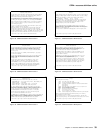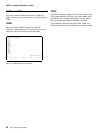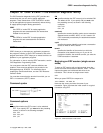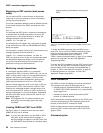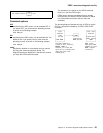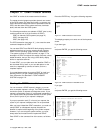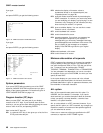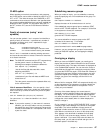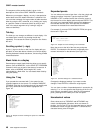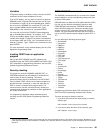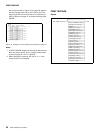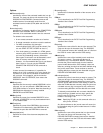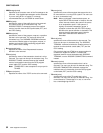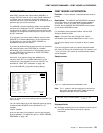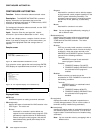CEMT—master terminal
CLASS option
When operating on terminals, transactions, and programs,
the CLASS option can be used to identify the suffix of a TLT,
XLT, or PLT. This limits the scope of the INQUIRE or SET
commands to those resources defined in the specified table.
Any resources whose definitions have not been installed are
displayed as NOT FOUND. For information about the TLT,
the XLT, and the PLT, see the
CICS Resource Definition
Guide
.
Family of resources (using * and +
symbols)
You can use the symbols * and + as part of an identifier to
specify a family of resources. * represents any number of
characters (including none), and + represents a single
character, for example:
Use of * and + is restricted to selecting existing resources
and cannot be used either to create a new set of resources
or to discard resources.
| Note: The INQUIRE command and the SET command may
| use the generic name in a different way. The
| following two examples illustrate the difference:
| CEMT INQUIRE FI(ᑍ) DSN(ABCDᑍ)
| lists all the files with data sets with a name
| beginning with ABCD.
| CEMT SET FI(ᑍ) DSN(ABCDᑍ) CLO
| associates all your files with data set ABCD* and
| closes them all.
| Thus the generic name has the expected effect only
| for the resource itself.
List of resource identifiers: You can specify a list of
resource identifiers, rather than a single one, separating the
items in the list by commas or blanks. Any errors of syntax
are reported.
| CEMT SET TERMINAL(TO1,TO2,TO3,TO4) INSERVICE
You cannot use * or + when the identifier is in a list of
identifiers.
| Note: If you use the comma (,) in the name of a resource
| identifier, you will not be able to use any commands
| that permit the use of lists of resources, because the
| comma will be treated as a list separator, and not as
| a part of a name.
Subdefining resource groups
When you make an inquiry, you can subdefine a resource
group by specifying one or more attributes of the group. For
example:
CEMT INQUIRE TERMINAL ALL INSERVICE
displays the status of all terminals that are in service.
If the subdefined resource group has no members, CEMT
returns a NOT FOUND response. For example, if all the files
in the system are closed, the command:
CEMT INQUIRE FILE ALL OPEN
gives the NOT FOUND response.
You cannot subdefine a resource group on the SET
command in the same way. For example:
CEMT SET TERMINAL ALL INSERVICE PAGE
puts all terminals both in service and into page status.
However, you can manage such groups of resources by
issuing an INQUIRE request, and overtyping the display
produced.
Overtyping a display
When you issue an INQUIRE request, you usually get a
display that consists of status information for each resource
in the specified group. The status information is displayed as
a list of abbreviated keywords. You can move the cursor to
some fields and change their contents by overtyping. When
you press the ENTER key again, CICS reads the contents of
all fields that have been changed, and processes any valid
operations implied by the changes. If you make an invalid
change, you get an error message, and the field is not
changed.
When a field is overtyped, CEMT will accept and identify only
as few characters as are necessary to uniquely identify the
keyword within the valid options for that position. This is
usually only one character.
On many of the status displays, the current status is
displayed in certain positional fields at the right-hand side of
the display. For some fields, the positional display appears
only when the status of a particular resource is ‘on’. You can
overtype the current status (when it is either displayed or
blank) to change it.
So, for example, if you type ‘CEMT INQUIRE SYD’, you get
a display of the current settings of the entries in the system
dump table. The various attributes of those entries are
displayed in fields across the screen. If CICS is to be shut
down after the occurrence of an error for this dump code,
‘Shu’ appears in the third field of attributes for that dump
code. If CICS is not to be shut down, however, the ‘Shu’
space is left blank. If you want CICS to be shut down for
this dump code, you can tab to that field and type ‘shu’ in
that blank space in that field only.
A* all identifiers beginning with A
*DATA* all identifiers containing the characters DATA
TERM00+ all 7-character identifiers starting with TERM00.
Chapter 11. Master terminal CEMT
47



